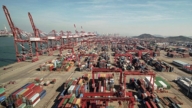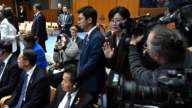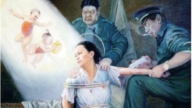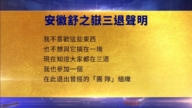【新唐人2011年7月22日訊】新疆“7.5”事件已過去兩年了,然而兩年後的7月18號,新疆再度發生流血衝突。近來,內蒙古、新疆、西藏先後爆發大規模衝突事件,北京一直以來實行的軟硬兩手策略,為甚麼不能安撫這些少數民族?中共的邊疆政策再度成為關注的焦點。請看報導。
新疆和田市18號發生流血事件,7月20號,中共當局首次公布,在衝突中警方打死了14人。並指控是維吾爾人恐怖襲擊派出所導致的。
而《美國之音》「維族組織稱中國官方有關暴亂說法漏洞百出」的報導說:「世界維吾爾代表大會」發言人迪裡夏提質疑中共,他表示,中共當局對維吾爾人在抗議之前遭到的武力鎮壓和衝突,刻意迴避,而且指控20多人參與事件,並說有2人死亡,但是當「世維會」發佈信息指出有20人死亡時,當局後來才更改為14人。
中共還指控喀甚地區的維吾爾人流竄到和田,不過,迪裡夏提質問:如果喀甚地區有恐怖涉嫌,為何不在喀甚作案,而流竄到和田?中共沒有提出有力的、令人信服的證據。
《北京之春》雜誌主編胡平表示,中共政權和少數民族的關係搞得這麼緊張,超過歷史上任何時候。
胡平(雜誌主編):“共產黨它名義上是自治,但大家誰都知道它根本不是自治。而且它對這些少數民族的控制,甚至比它對這些漢人的少數控制還要更嚴厲。共產黨它掌權60年了,在這些所有地方的,自治區的第一把手,單位第一書記,那都不是由少數民族擔任,都是由漢族擔任。”
胡平認為,現在少數民族的自我意識、公民的意識、自由權利的意識和自治的意識,都比原來更強。中共強制壓迫與歧視少數民族的作法,就會造成層出不窮的矛盾與衝突。
今年5月25號,2000多名蒙古族學生和牧民,在內蒙古自治區政府所在地示威,要求懲罰碾死牧民莫日根的肇事者。
5月29日,配備盾牌,警棍和頭盔的數百名武警和防暴警察,在呼和浩特市戒嚴,有的大學進出口被警察封鎖,內蒙古多個城鎮的互聯網被中斷或完全切斷。
法學教授袁紅冰:“最近一段時間以來啊,中國境內最大的三個少數民族地區,一個是西藏、一個是內蒙、一個是新疆,發生的一系列的少數民族反抗中共暴政的事件,據我們了解呢,媒體上公開公布出來的那些事件,只是實際發生事件的一小部分。更多的少數民族的反抗,被中共的新聞鐵幕封閉在這個中國的境內。外邊的人更不能廣泛的知道這些事情。”
法學教授袁紅冰表示,現在各少數民族反抗中共暴政的行為,已經掀起了新的高潮。為甚麼會變成這種情況?主要是因為中共在各少數民族地區施行的政治、經濟和文化政策造成的。
袁紅冰:“從政治和文化的角度講,中共對各個少數民族一直施行的是文化型的種族滅絕。也就是說它們要用中共的黨文化,來取代各個少數民族自己的文化。”
從經濟上,中共對各個少數民族地區的自然資源,進行掠奪性的開發和利用。
袁紅冰說,中共表面上投入資金,所謂支持少數民族地區的發展,實際上卻從各個少數民族地區攫取、掠奪走大量自然資源。
袁紅冰:“也就是以一種極其不負責任的一種『殖民主義者』的方式,從少數民族大量的掠奪財富、掠奪自然資源。造成生態環境極其嚴重的破壞。這種破壞實際在相當程度上已經影響到了各少數民族地區人民的生存。”
袁紅冰最後表示,今天少數民族一系列的反抗,說明中共的邊疆政策已經遭到了徹底的失敗。少數民族對中共的反抗會越來越激烈。
新唐人記者周玉林、唐睿、周平採訪報導。
Conflicts with Minorities Escalate
Two years after the Xinjiang incident on July 5, 2009,
bloodshed took place again on July 18, 2011.
Recently, large-scale conflicts have broken out
in Inner Mongolia, Xinjiang and Tibet.
Both soft and hard policies used Beijing
cannot pacify the angers of China』s ethnic minorities.
The Chinese Communist Party』s (CCP)
ethnic policies once again draw the world』s attention.
Let』s take a closer look.
Bloodshed occurred in Hotan, Xinjiang on July 18.
On July 20, the CCP authorities first announced that
14 people were killed by the police in the conflict.
The CCP accused the Uyghur people for
a terrorist attack on a local police station
and for causing the bloodshed.
According to Voice of America,
the World Uyghur Congress』s spokesman Dilxat Raxit
questioned why the CCP authorities avoided mentioning
that the Uyghurs had already been violently suppressed
even before they protested.
He also questioned why the authorities first accused
20 Uyghur people of participating in the incident
and said there were two deaths,
but later changed to 14 deaths
after the World Uyghur Congress announced 20 deaths.
The authorities also accused the Uyghurs in Kashgar
of going to Hotan to carry out terrorist acts.
However, Dilxat Raxit questioned,
if they were terrorists,
why did not they launch terrorist attacks
in the nearby Kashgar?
The CCP did not present any powerful, convincing evidence.
Hu Ping, editor-in-chief of Beijing Spring said,
the relationship between the CCP regime and
the minorities is the most tense in history.
Hu Ping: “Xinjiang is nominally autonomous.
However, everyone knows that it is not, in reality.
The CCP』s control over minorities is
even tighter than over some of the Han people.
Throughout the CCP』s rule of 60 years,
the first commander in the autonomous regions
has always been a Han national.
The CCP has never appointed any minorities.”
Hu believes that the ethnic minorities』 self-conscience
and the awareness for citizenship and freedom
are stronger than ever before.
The CCP』s suppressive and discriminating acts
are bound to create unceasing conflicts and discords.
On May 25, 2011, over 2000 Mongolian students
and herdsmen gathered in the capital of Inner Mongolia,
requesting the punishment of the criminals
who crushed a herdsman called Mergen to death.
On May 29, hundreds of riot policemen
armed with shields, armors and batons
carried out marshal law in Hohhot City.
The entrances of some universities
were blocked by police.
Internet connections were cut off
in many cities and towns in Inner Mongolia.
Yuan Hongbing, professor of law:
“Recently, in the three major regions
inhabited by ethnic minorities,
i.e., Tibet, Inner Mongolia and Xinjiang,
a series of incidents opposing CCP』s tyranny occurred.
As we know, only a small number of
these incidents were reported on the Chinese media.
Instead, many such anti-suppression incidents
were stifled by the CCP』s censorship.
People outside of China
have trouble accessing such information.
Yuan said, a new wave of anti-CCP tyranny
by ethnic minorities is developing.
What』s the reason?
It was because the CCP has implemented unpopular
political, economical and cultural policies in these regions.
Yuan: “From the political and cultural perspectives,
the CCP has been carrying out a cultural genocide.
In other words, the CCP wants to use its party culture
to replace the minorities』 own cultures.”
The CCP robbed and developed natural resources
in a predatory way, in all ethnic minority regions.
Yuan said, superficially, the CCP has invested a lot
to support the so-called development in these regions.
However, in fact, the CCP has taken away
a large amount of natural resources.
Yuan: “In an extremely irresponsible 『colonist』 manner,
the CCP has plundered the wealth and natural resources.
This has caused a serious damage to the environment.
The ecological damage has already affected
the survival of the minorities.
Yuan said in the end that
the series of minority resistance indicates that
the CCP』s minority polices failed completely.
It is expected that the minority resistance
to the CCP will be increasingly intense.
NTD reporters Zhou Yulin, Tang Rui and Zhou Ping





























